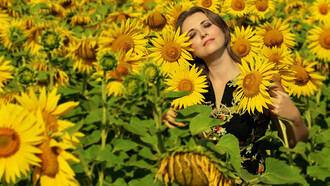Why are we afraid to sing? So many people who are otherwise confident in their lives, in their interaction with other people, can suddenly be paralyzed when confronted with the opportunity to sing, to have their voice heard by someone else.
I was praised at an early age for my guitar playing, but not for my voice. My father wanted me to be successful, and believed I would fail if I tried to accomplish this with singing - but with guitar, he believed I had a much better chance. His intention was only for my success, but of course it didn’t feel so good for me on the inside. Still, despite his guidance to close the door on singing, I continued on this path.
Along the way I met many who were shy, afraid, or discouraged from singing for one reason or another. This led me eventually to develop a workshop for people to approach their fears in a respectful, honoring way, with a method that allowed anyone to return to a more innocent form of creative vocal expression.
In our 2018 film, Beyond the Fear of Singing, Mark Fox (author, True Voice), offered this insight:
Before you actually sing for someone a great, great sense of fear starts to come up. And it’s a fear that most people then use as a reason not to take that step. They don’t want to sing in front of other people, because it’s, it’s too scary, and it’s too risky. Because when we sing for other people, we’re naked. Some deep, some essential part of ourselves will in that moment be revealed and will be exposed. And when we do that in front of people that we don’t know, or that we don’t know that they can maybe appreciate that - if they can like it, if they can understand in any way what we’re going through in order to, to sing for them, then a danger signal goes off.
The reason that the most people think we sing is in order to make a performance, in order to get on stage, sing for a lot of people, sing a song - basically to create an aesthetic experience. And a singer basically has a job, and that is to fulfill an aesthetic goal. And most people then measure themselves and their own voice by a very, very high and basically unrealistic standard, what a professional singer can do after years and years of lessons and coachings and an enormous natural talent… is for most people a very unrealistic goal.
Most people unconsciously measure themselves - measure their own voice, against a very, very experienced professional singer. This puts the voice right back in the closet. It puts people’s ability to feel comfortable expressing their inner world, their inner life, their soul life, and sharing it with the world, it stops all of that.
Most children learn very, very quickly that they don’t have that kind of sound, they don’t have that kind of voice to compare with that. Most children just stop at some point. There’s also a sort of ritual, children in the school maybe, maybe at home, children put in front of a crowd of people, maybe their schoolmates, maybe their family, and they’re asked, maybe forced to sing a song - and for many, many children, but also adults, it really is almost like an execution.
Many people remember the trauma of being ‘put on stage’ at an early age. Jerry Jampolsky, MD, author of Love Is Letting Go Of Fear, had this to say:
I wasn’t able to sing very well when I was a kid. When I was five years old I was asked to be in a Christmas play. When we got to the practice, our teacher came up to me and said, ‘Jerry, when we’re all singing, what you need to do is just ‘mouth’ the words, but don’t sing’. I just remember what a traumatic episode that was for me to be less than what was expected. It was a judgment made by another person, but it was a judgment I continued to make about myself.
The question about the origins of our fear was also put to Irish neuro-physician, Bruce Bough, at the annual Cortona Conference of Science and Spirit. His response, also included in the film, provides insight into our psychological defenses, and how we might move past them.
Words from Bruce Bough:
Singing is one of the most natural experiences in the world, and a lot of people get tremendous enjoyment from it and yet other people will tell you they can’t sing, and are afraid to even try.
Why should that be? Well, it’s probably down to our brains and our childhood experiences. The brain is not designed just for thinking, it’s mainly designed for survival.
And whilst we go about the tasks that we enjoy doing and concentrate on, in the background a huge part of our unconscious brain is monitoring the environment the whole time, all our surroundings, for potential threats to our survival.
And when it feels that there’s something that might threaten us, it responds, and it makes our body respond, it prepares us to run away, to stand and fight, or to freeze and hide, and these responses are known as the fight, flight or freezing responses to a threat- and these responses produce changes in the body, your pulse rate increases, you get a dry throat, your stomach is tightening up. And we give that a name - we call it fear.
And most people are afraid of fear, but fear is actually wisdom in the presence of danger. It’s a very wise thing to be fearful in the presence of danger.
So what happens if somebody has one of these experiences, in a situation such as a child, they’re asked to sing? Or they attempt to sing, and for some reason, could be anything, their sore throat, or they feel under pressure, it doesn’t turn out too well.
And this fear response starts up, and they remember it, and it’s stored away in their memory along with the experience, so that they associate being asked to sing with this fearful memory.
And you may forget about the experience, but sometime later somebody asks you to sing, and because your brain is monitoring for possible danger, it reaches down into the memory and says the last time that we did this, it didn’t work out too well, we better avoid it! So, this time it says: “No, I can’t sing, I can’t sing.” It’s nothing to do with whether you can or you can’t, your brain has just decided it’s safer for you not to sing.
So, if you’ve had this experience in childhood, and you’ve long forgotten about it, and now you’re an adult, and you’ve an opportunity to sing, isn’t it such a shame, and believe you can’t - just because your brain is trying to protect you from a childhood experience?
As people want to experience more aliveness, they begin to question their old and limiting patterns and beliefs. This includes old attitudes toward the voice, and the tendency for many to hold back one’s expression. It has been heartening to see, as a consequence of our film, the shift towards freer creative expression is being experienced by even more people.
If you are familiar with feelings of reluctance around singing, it could be a good time to give yourself more room to move and breathe, more space to express and play, and more courage to sing your song.















